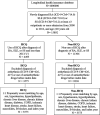Hydroxychloroquine Does Not Increase the Risk of Cardiac Arrhythmia in Common Rheumatic Diseases: A Nationwide Population-Based Cohort Study
- PMID: 33868251
- PMCID: PMC8050346
- DOI: 10.3389/fimmu.2021.631869
Hydroxychloroquine Does Not Increase the Risk of Cardiac Arrhythmia in Common Rheumatic Diseases: A Nationwide Population-Based Cohort Study
Abstract
Objectives: Hydroxychloroquine (HCQ) is widely used to treat rheumatic diseases including rheumatoid arthritis (RA), systemic lupus erythematosus (SLE) and Sjögren's syndrome (SS). Cardiac arrhythmia has been concerned as important safety issue for HCQ. The aim of this study was to investigate whether hydroxychloroquine increases new-onset arrhythmia among patients with RA, SLE or SS.
Methods: This was a retrospective cohort study that conducted from the longitudinal health insurance database of Taiwan. Patients with newly diagnosed RA, SLE or SS with age ≥20 years old were selected from 2000 to 2012. Patients who received HCQ and without HCQ treatment groups were matched by propensity score to minimize the effect of selection bias and confounders. The Cox proportional hazard model was used to analyze the risk of arrhythmia between the two groups after controlling for related variables.
Results: A total of 15892 patients were selected to participate and finally 3575 patients were enrolled in each group after matching. There was no different risk of all arrhythmia in patients using HCQ than without HCQ (adjusted hazards ratio 0.81, 95% CI 0.61-1.07) and ventricular arrhythmia as well. The incidence of arrhythmia did not increase when HCQ co-administrated with macrolides. The arrhythmia risk was also not different regardless of daily HCQ dose <400mg or ≥400mg or follow-up duration of ≦4 months or >4 months.
Conclusion: The administration of HCQ did not increase the risk of all cardiac arrhythmia and ventricular arrhythmia regardless of different duration of treatment (≦4 months or >4 months) or cumulative dose (<400mg or ≥400mg) in patients with common autoimmune diseases such as RA, SLE and SS.
Keywords: Hydroxychloroquine; Sjögren's syndrome; arrhythmia; rheumatoid arthritis; systemic lupus erythematosus.
Copyright © 2021 Lo, Wei, Wang, Tsai, Chan, Li, Lo and Su.
Conflict of interest statement
The authors declare that the research was conducted in the absence of any commercial or financial relationships that could be construed as a potential conflict of interest.
Figures




References
-
- Alarcon GS, McGwin G, Bertoli AM, Fessler BJ, Calvo-Alen J, Bastian HM, et al. . Effect of hydroxychloroquine on the survival of patients with systemic lupus erythematosus: data from LUMINA, a multiethnic US cohort (LUMINA L). Ann Rheum Dis (2007) 66:1168–72. 10.1136/ard.2006.068676 - DOI - PMC - PubMed
MeSH terms
Substances
LinkOut - more resources
Full Text Sources
Other Literature Sources
Medical

